Styne
On this page, you find all documents, package deals, and flashcards offered by seller Styne.
- 532
- 0
- 8
Community
- Followers
- Following
541 items
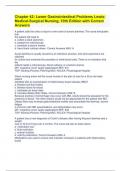
Chapter 42: Lower Gastrointestinal Problems Lewis: Medical-Surgical Nursing, 10th Edition
A patient calls the clinic to report a new onset of severe diarrhea. The nurse anticipates that the patient will need to a. collect a stool specimen. . b. prepare for colonoscopy. c. schedule a barium enema d. have blood cultures drawn. Correct Answers ANS: A Acute diarrhea is usually caused by an infectious process, and stool specimens are obtained for culture and examined for parasites or white blood cells. There is no indication that the patient needs a colonoscopy, blood cultures,...
- Exam (elaborations)
- • 20 pages •
A patient calls the clinic to report a new onset of severe diarrhea. The nurse anticipates that the patient will need to a. collect a stool specimen. . b. prepare for colonoscopy. c. schedule a barium enema d. have blood cultures drawn. Correct Answers ANS: A Acute diarrhea is usually caused by an infectious process, and stool specimens are obtained for culture and examined for parasites or white blood cells. There is no indication that the patient needs a colonoscopy, blood cultures,...

Lewis - Chapter 13: Altered Immune Responses and Transplantation
The nurse provides discharge instructions to a patient who has an immune deficiency involving the T lymphocytes. Which screening should the nurse include in the teaching plan for this patient? a. Screening for allergies b. Screening for malignancy c. Antibody deficiency screening d. Screening for autoimmune disorders Correct Answers ANS: B Cell-mediated immunity is responsible for the recognition and destruction of cancer cells. Allergic reactions, autoimmune disorders, and antibody deficie...
- Exam (elaborations)
- • 20 pages •
The nurse provides discharge instructions to a patient who has an immune deficiency involving the T lymphocytes. Which screening should the nurse include in the teaching plan for this patient? a. Screening for allergies b. Screening for malignancy c. Antibody deficiency screening d. Screening for autoimmune disorders Correct Answers ANS: B Cell-mediated immunity is responsible for the recognition and destruction of cancer cells. Allergic reactions, autoimmune disorders, and antibody deficie...
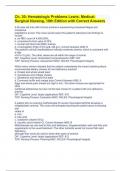
Ch. 30: Hematologic Problems Lewis: Medical-Surgical Nursing, 10th Edition
A 62-year old man with chronic anemia is experiencing increased fatigue and occasional palpitations at rest. The nurse would expect the patient's laboratory test findings to include a. an RBC count of 4,500,000/L. b. a hematocrit (Hct) value of 38%. c. normal red blood cell (RBC) indices. d. a hemoglobin (Hgb) of 8.6 g/dL (86 g/L). Correct Answers ANS: D The patient's clinical manifestations indicate moderate anemia, which is consistent with a Hgb of 6 to 10 g/dL. The other values are a...
- Exam (elaborations)
- • 18 pages •
A 62-year old man with chronic anemia is experiencing increased fatigue and occasional palpitations at rest. The nurse would expect the patient's laboratory test findings to include a. an RBC count of 4,500,000/L. b. a hematocrit (Hct) value of 38%. c. normal red blood cell (RBC) indices. d. a hemoglobin (Hgb) of 8.6 g/dL (86 g/L). Correct Answers ANS: D The patient's clinical manifestations indicate moderate anemia, which is consistent with a Hgb of 6 to 10 g/dL. The other values are a...
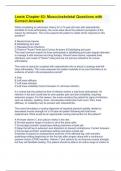
Lewis Chapter 63: Musculoskeletal Questions
While completing an admission history for a 73-year-old man with osteoarthritis admitted for knee arthroplasty, the nurse asks about the patient's perception of the reason for admission. The nurse expects the patient to relate which response to this question? A Recent knee trauma B Debilitating joint pain C Repeated knee infections D Onset of "frozen" knee joint Correct Answers B Debilitating joint pain The most common reason for knee arthroplasty is debilitating joint pain despite a...
- Exam (elaborations)
- • 19 pages •
While completing an admission history for a 73-year-old man with osteoarthritis admitted for knee arthroplasty, the nurse asks about the patient's perception of the reason for admission. The nurse expects the patient to relate which response to this question? A Recent knee trauma B Debilitating joint pain C Repeated knee infections D Onset of "frozen" knee joint Correct Answers B Debilitating joint pain The most common reason for knee arthroplasty is debilitating joint pain despite a...
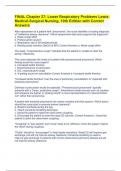
FINAL Chapter 27: Lower Respiratory Problems Lewis: Medical-Surgical Nursing, 10th Edition
After assessment of a patient with *pneumonia*, the nurse identifies a nursing diagnosis of *ineffective airway clearance*. Which assessment data best supports this diagnosis? a. Weak cough effort b. Profuse green sputum c. Respiratory rate of 28 breaths/minute d. Resting pulse oximetry (SpO2) of 85% Correct Answers a. Weak cough effort The weak, *nonproductive cough* indicates that the patient is *unable to clear the airway* effectively. The nurse assesses the chest of a patient with ...
- Exam (elaborations)
- • 23 pages •
After assessment of a patient with *pneumonia*, the nurse identifies a nursing diagnosis of *ineffective airway clearance*. Which assessment data best supports this diagnosis? a. Weak cough effort b. Profuse green sputum c. Respiratory rate of 28 breaths/minute d. Resting pulse oximetry (SpO2) of 85% Correct Answers a. Weak cough effort The weak, *nonproductive cough* indicates that the patient is *unable to clear the airway* effectively. The nurse assesses the chest of a patient with ...
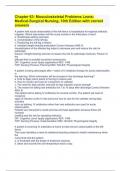
Chapter 63: Musculoskeletal Problems Lewis: Medical-Surgical Nursing, 10th Edition
A patient with acute osteomyelitis of the left femur is hospitalized for regional antibiotic irrigation. Which intervention will the nurse include in the initial plan of care? a. Quadriceps-setting exercises b. Immobilization of the left leg c. Positioning the left leg in flexion d. Assisted weight-bearing ambulation Correct Answers ANS: B Immobilization of the affected leg helps to decrease pain and reduce the risk for pathologic fracture. Weight-bearing exercise increases the risk for p...
- Exam (elaborations)
- • 24 pages •
A patient with acute osteomyelitis of the left femur is hospitalized for regional antibiotic irrigation. Which intervention will the nurse include in the initial plan of care? a. Quadriceps-setting exercises b. Immobilization of the left leg c. Positioning the left leg in flexion d. Assisted weight-bearing ambulation Correct Answers ANS: B Immobilization of the affected leg helps to decrease pain and reduce the risk for pathologic fracture. Weight-bearing exercise increases the risk for p...
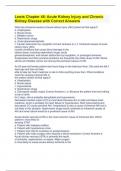
Lewis Chapter 46: Acute Kidney Injury and Chronic Kidney Disease
What are intrarenal causes of acute kidney injury (AKI) (select all that apply)? a. Anaphylaxis b. Renal stones c. Bladder cancer d. Nephrotoxic drugs e. Acute glomerulonephritis f. Tubular obstruction by myoglobin Correct Answers d, e, f. Intrarenal causes of acute kidney injury (AKI) include conditions that cause direct damage to the kidney tissue, including nephrotoxic drugs, acute glomerulonephritis, and tubular obstruction by myoglobin, or prolonged ischemia. Anaphylaxis and o...
- Exam (elaborations)
- • 30 pages •
What are intrarenal causes of acute kidney injury (AKI) (select all that apply)? a. Anaphylaxis b. Renal stones c. Bladder cancer d. Nephrotoxic drugs e. Acute glomerulonephritis f. Tubular obstruction by myoglobin Correct Answers d, e, f. Intrarenal causes of acute kidney injury (AKI) include conditions that cause direct damage to the kidney tissue, including nephrotoxic drugs, acute glomerulonephritis, and tubular obstruction by myoglobin, or prolonged ischemia. Anaphylaxis and o...
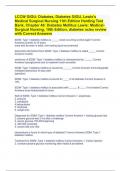
LCCW GIGU: Diabetes, Diabetes GIGU, Lewis's Medical Surgical Nursing 11th Edition Harding Test Bank, Chapter 48: Diabetes Mellitus Lewis: Medical-Surgical Nursing, 10th Edition, diabetes nclex review
IDDM- Type 1 diabetes mellitus is _____ onset occurring at what ages? Correct Answers juvenile; 8-15 years (may also be seen in adult, now seeing equal occurrences) destruction left behind from IDDM- Type 1 diabetes mellitus is called _____ Correct Answers insulitis syndrome of IDDM- Type 1 diabetes mellitus is characterized by ______ Correct Answers hyperglycemia due to impaired insulin secretion IDDM- Type 1 diabetes mellitus is caused by ______ Correct Answers immunologically mediat...
- Exam (elaborations)
- • 57 pages •
IDDM- Type 1 diabetes mellitus is _____ onset occurring at what ages? Correct Answers juvenile; 8-15 years (may also be seen in adult, now seeing equal occurrences) destruction left behind from IDDM- Type 1 diabetes mellitus is called _____ Correct Answers insulitis syndrome of IDDM- Type 1 diabetes mellitus is characterized by ______ Correct Answers hyperglycemia due to impaired insulin secretion IDDM- Type 1 diabetes mellitus is caused by ______ Correct Answers immunologically mediat...

Lewis Chapter 32: Hypertension/Medical-Surgical Nursing, 10th Edition
The nurse teaches a 28-year-old man newly diagnosed with hypertension about lifestyle modifications to reduce his blood pressure. Which statement by the patient requires an intervention by the nurse? A "I will avoid adding salt to my food during or after cooking." B "If I lose weight, I might not need to continue taking medications." C "I can lower my blood pressure by switching to smokeless tobacco." D "Diet changes can be as effective as taking blood pressure medications." Cor...
- Exam (elaborations)
- • 15 pages •
The nurse teaches a 28-year-old man newly diagnosed with hypertension about lifestyle modifications to reduce his blood pressure. Which statement by the patient requires an intervention by the nurse? A "I will avoid adding salt to my food during or after cooking." B "If I lose weight, I might not need to continue taking medications." C "I can lower my blood pressure by switching to smokeless tobacco." D "Diet changes can be as effective as taking blood pressure medications." Cor...
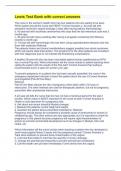
Lewis Test Bank
The nurse in the women's health clinic has four patients who are waiting to be seen. Which patient should the nurse see FIRST? Correct Answers a. 22-year-old with persistent red-brown vaginal drainage 3 days after having balloon thermotherapy b. 42-year-old with secondary amenorrhea who says that her last menstrual cycle was 3 months ago c. 35-year-old with heavy spotting after having a progestin-containing IUD (Mirena) inserted a month ago D. 19-year-old with menorrhagia who has been using...
- Package deal
- Exam (elaborations)
- • 13 pages •
The nurse in the women's health clinic has four patients who are waiting to be seen. Which patient should the nurse see FIRST? Correct Answers a. 22-year-old with persistent red-brown vaginal drainage 3 days after having balloon thermotherapy b. 42-year-old with secondary amenorrhea who says that her last menstrual cycle was 3 months ago c. 35-year-old with heavy spotting after having a progestin-containing IUD (Mirena) inserted a month ago D. 19-year-old with menorrhagia who has been using...
